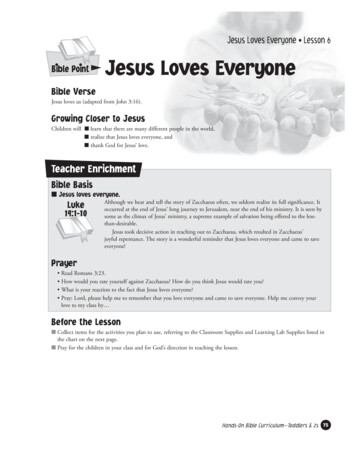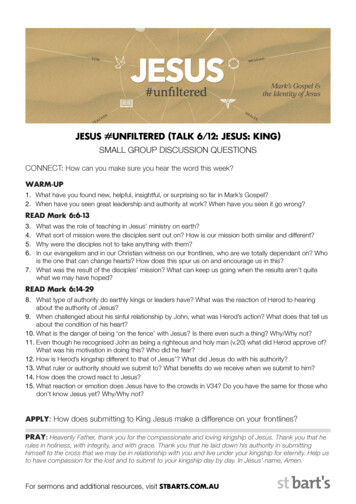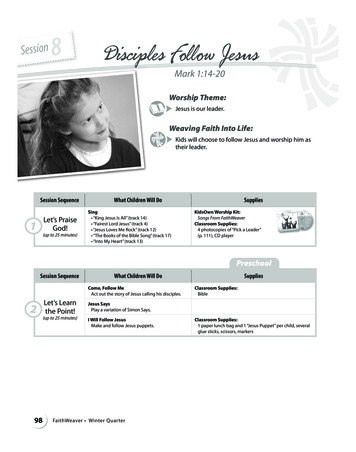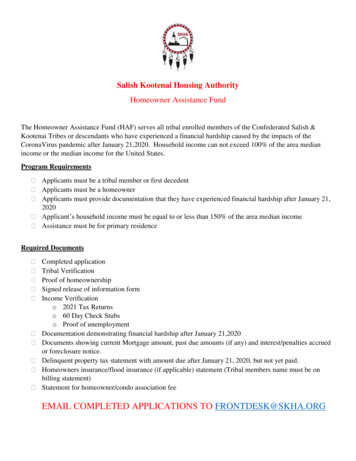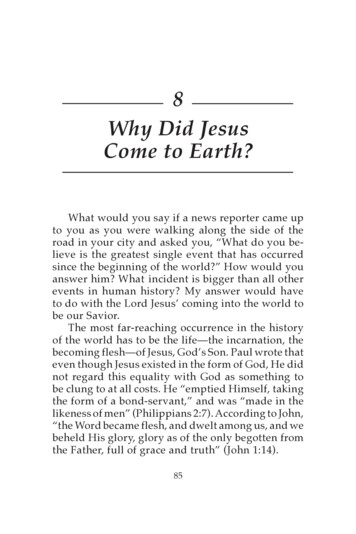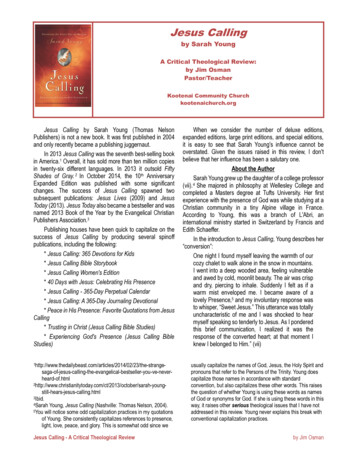
Transcription
Jesus Callingby Sarah YoungA Critical Theological Review:by Jim OsmanPastor/TeacherKootenai Community Churchkootenaichurch.orgJesus Calling by Sarah Young (Thomas NelsonPublishers) is not a new book. It was first published in 2004and only recently became a publishing juggernaut.In 2013 Jesus Calling was the seventh best-selling bookin America.1 Overall, it has sold more than ten million copiesin twenty-six different languages. In 2013 it outsold FiftyShades of Gray. 2 In October 2014, the 10th AnniversaryExpanded Edition was published with some significantchanges. The success of Jesus Calling spawned twosubsequent publications: Jesus Lives (2009) and JesusToday (2013). Jesus Today also became a bestseller and wasnamed 2013 Book of the Year by the Evangelical ChristianPublishers Association.3Publishing houses have been quick to capitalize on thesuccess of Jesus Calling by producing several spinoffpublications, including the following:* Jesus Calling: 365 Devotions for Kids* Jesus Calling Bible Storybook* Jesus Calling Women's Edition* 40 Days with Jesus: Celebrating His Presence* Jesus Calling - 365-Day Perpetual Calendar* Jesus Calling: A 365-Day Journaling Devotional* Peace in His Presence: Favorite Quotations from JesusCalling* Trusting in Christ (Jesus Calling Bible Studies)* Experiencing God's Presence (Jesus Calling ah Young, Jesus Calling (Nashville: Thomas Nelson, 2004).5You will notice some odd capitalization practices in my quotationsof Young. She consistently capitalizes references to presence,light, love, peace, and glory. This is somewhat odd since weJesus Calling - A Critical Theological ReviewWhen we consider the number of deluxe editions,expanded editions, large print editions, and special editions,it is easy to see that Sarah Young's influence cannot beoverstated. Given the issues raised in this review, I don'tbelieve that her influence has been a salutary one.About the AuthorSarah Young grew up the daughter of a college professor(vii). 4 She majored in philosophy at Wellesley College andcompleted a Masters degree at Tufts University. Her firstexperience with the presence of God was while studying at aChristian community in a tiny Alpine village in France.According to Young, this was a branch of L'Abri, aninternational ministry started in Switzerland by Francis andEdith Schaeffer.In the introduction to Jesus Calling, Young describes her“conversion”:One night I found myself leaving the warmth of ourcozy chalet to walk alone in the snow in mountains.I went into a deep wooded area, feeling vulnerableand awed by cold, moonlit beauty. The air was crispand dry, piercing to inhale. Suddenly I felt as if awarm mist enveloped me. I became aware of alovely Presence,5 and my involuntary response wasto whisper, “Sweet Jesus.” This utterance was totallyuncharacteristic of me and I was shocked to hearmyself speaking so tenderly to Jesus. As I ponderedthis brief communication, I realized it was theresponse of the converted heart; at that moment Iknew I belonged to Him.” (vii)usually capitalize the names of God, Jesus, the Holy Spirit andpronouns that refer to the Persons of the Trinity. Young doescapitalize those names in accordance with standardconvention, but also capitalizes these other words. This raisesthe question of whether Young is using these words as namesof God or synonyms for God. If she is using these words in thisway, it raises other serious theological issues that I have notaddressed in this review. Young never explains this break withconventional capitalization practices.by Jim Osman
To the discerning reader, that would sound like anythingbut a solid conversion testimony. But this type of feelingsbased, subjective experience is what characterizes JesusCalling. The book is light on theology and heavy on feelingsand experience.A slightly more robust mention of gospel truths iscontained in the introduction to Jesus Today, where Youngwrites:For Christians, our hope is firmly anchored in thecross of Christ. Because He paid the penalty for allour sins, we know that we are fully forgiven and thatultimately our story finishes well—at the portals ofheaven! Even now, as we live in the trenches of thisworld, we are assured that God is in control and Heis good.I referred to heaven quite a bit in this book. So I wantto clarify that this glorious future is for all of us —andonly those of us—who acknowledge our sinfulnessand ask for the forgiveness Jesus secured throughHis finished work on the cross.6After her conversion, Young attended CovenantTheological Seminary in St. Louis and earned a Mastersdegree in counseling and biblical studies. There she met herhusband, Steve, who is a third-generation missionary toJapan. After graduation, they spent two 4-year terms inJapan, doing church-planting work. After returning fromJapan, they lived in Atlanta, where Steve worked with a localJapanese church and Sarah earned a further degree incounseling at Georgia State University.According to the brief biography provided on the LifewayChristian Resources website, Sarah and Steve Young “arecurrently ministering to Japanese people and helpingestablish an international church in Australia.”7Sarah Young rarely grants interviews and lives a ratherreclusive life, considering that her books have become almostan industry unto itself. She has remained absent from theconference and media circuits that characterize so manyother best-selling authors. In her book, Jesus Today, Youngspeaks openly of physical suffering from vertigo and Lymedisease that have kept her seriously ill for years. That maypartly explain her lack of media presence.accustomed.Young’s 365 “devotionals” would be more accuratelydescribed as “personalized revelations” or “messages.” Infact, Young refers to them as “messages” in her introduction.She describes how these “messages” from Jesus are writtenthrough her to you.She writes:This practice of listening to God has increased myintimacy with Him more than any other spiritualdiscipline, so I want to share some of the messagesI have received. I have written them from Jesus'point of view; i.e., the first-person singular ( I, Me,Mine) always refers to Christ. “You” refers to you, thereader, so the perspective is that of Jesus speakingto you (xiii).In the last paragraph of her introduction, she writes:“These messages are meant to be read slowly, preferably ina quiet place. I invite you to keep a journal to record anythoughts or impressions you receive as you wait in Hispresence.”As you can see, Young regards these “devotionals” assomething far more than just her own devotional thoughts orinsights. She actually calls them “messages.” She regardsthese as direct, divine, personal revelations from Jesus to her,which she now offers to you. She believes that she hasreceived these revelations from Jesus.Each message is relatively brief. Some of them consistof only a short paragraph which takes a few moments to read.Even the longest message, which filled a whole page, onlytook me thirty seconds to read. Each day's message isaccompanied by Scripture references, which Young says sheincluded to provide additional depth for the reader.Here is a sample message. I opened the book randomlyand landed at the message for July 23:I am the Light of the world. Men crawl through theirlives cursing the darkness, but all the while I amshining brightly. I desire each of My followers to bea Light-bearer. The Holy Spirit who lives in you canshine from your face, making Me visible to peoplearound you. Ask My Spirit to live through you, as youwend your ways through this day. Hold My hand injoyful trust, for I never leave your side. The Light ofMy Presence is shining upon you. Brighten up theworld by reflecting who I AM.John 8:12; Matthew 5:14-16;2 Corinthians 3:18;Exodus 3:14That is it. That is a typical “message.”The messages are indeed written in the first person, asA Bit about the BookJesus Calling is billed as a devotional book for Christians.At the top of the cover we read, “Devotions for Every Day ofthe Year.” But this is not your standard devotional. This bookis unlike the Our Daily Bread (RBC) or Days of Praise (ICR)devotionals to which many Christians have become6SarahYoung, Jesus Today (Nashville: Thomas Nelson, 2012),xvi. Emphasis in the original.Jesus Calling - A Critical Theological -Sarah?No 12#resultsby Jim Osman2
if Jesus, Himself, were speaking. Some of the wording andlanguage is very similar to the passages that are referenced.You will notice that there is nothing theologically deep orprofound about that message. This is typical of all of themessages. There is nothing that will enhance your theologicalunderstanding nor deepen your knowledge of Scripture. Theyoffer nothing that is challenging or strong in doctrine andtheology. For the most part, the messages are weak, banal,and rather insipid.Further, there is not a lot of variety in the messages. mostof the messages that she offers revolve around the themes ofpeace, trust, and presence. In the introduction, Young admits:I have found themes of His Peace becoming moreprominent in my writing. I'm sure this tendencyreflects, in part, my personal need. However, when Iget to know people, I find that most of them alsodesire the balm of Jesus' Peace” (xiii).Indeed, Young does not stray very far from the theme. Thismakes for very repetitive and trite reading.Though the publisher has changed “listening to God” to“practice of being still” and “messages I have received” to“writings I have gleaned,” it has done nothing to alleviate theconcerns that we should rightly have concerning this book.Jesus Calling is still written in the voice of Jesus, as if Jesuswere speaking these very words. A rose by any other name .A Critical Theological ReviewAs Christians we are called to “examine everythingcarefully; hold fast to that which is good; abstain from everyform of evil” (1 Thessalonians 1:23-24). We should strive tobe like the Bereans who examined the Scriptures daily to testPaul's message. If the apostle Paul was not above scrutiny,then certainly Sarah Young is not either.The critique that follows is not intended to be meanspirited. It is intended to examine her claims and herpurported personal revelations in the light of the inerrant andinfallible Word of God. Young claims to be a channel of divinerevelation to Christians today. This should concern everybeliever. Given her claims, she deserves a carefulexamination in the light of Truth.The 10th Anniversary EditionSarah Young's claims that she has received these“messages” from Jesus have been appropriately criticized inmany Christian circles. In what seems like an attempt to avoidcriticism, the publisher changed some of the wording in thenew 10th anniversary edition of Jesus Calling.For instance, compare the passage quoted earlier fromthe original book with the same passage in the newer edition:Original Introduction (2004):This practice of listening to God has increased myintimacy with Him more than any other spiritualdiscipline, so I want to share some of themessages I have received. In many parts of theworld, Christians seemed to be searching for adeeper experience of Jesus' Presence and Peace.The messages that follow address that felt need.1. Jesus Calling was inspired by New Age mystics.In an interview with the Christian Broadcasting Network,Sarah Young described how she learned to “dialogue” withGod. She said:My journey began with a devotional book (GodCalling) written in the 1930s by two women whopracticed waiting in God's Presence, writing themessages they received as they "listened." About ayear after I started reading this book, I began towonder if I too could receive messages during mytimes of communing with God. I had been writing inprayer journals for years, but this was one-waycommunication: "monologue." I knew that Godcommunicates through the Bible (and I treasure HisWord), but I wondered what He might say to mepersonally on a given day. So I decided to "listen"to God with pen in hand, writing down whatever Isensed He was saying. Of course, I wasn't listeningfor an audible voice; I was seeking the "still, smallvoice" of God in my mind/heart.9God Calling was written by two anonymous New Agemystic women in the 1930s. They claimed to be channelingdirect messages from Christ Himself.In the introduction to Jesus Calling, Young says of thisRecent Editions (2014):This practice of being still in God's Presence hasincreased my intimacy with Him more than any otherspiritual discipline, so I want to share some of thewritings I have gleaned from these quiet moments.In many parts of the world, Christians seem to besearching for a deeper experience of Jesus'Presence and Peace. The devotions that followaddress that felt ing-jesus-calling-Edition of Jesus Calling.damage-control-false-christ/. Visit this link for examples ofother changes that have been made in the 10th AnniversaryJesus Calling - A Critical Theological scallingqa.aspxby Jim Osman3
book:While I was living in Japan, someone had mailed thisbook to me from the U.S. I had not read it at thattime, but I had held onto the book through twointernational moves. Six or seven years later, thislittle paperback became a treasure to me. Itdovetailed remarkably well with my longing to live inJesus' Presence (xi).So, are we to believe that Jesus chose to reveal Himselfpersonally to Sarah Young, a woman so undiscerning that sheembraced “revelations” channeled through New Agemystics? Young is apparently so theologically naïve that shecannot see the problems with two New Age mystics whosupposedly channeled the spirit of Jesus.messages that are unbiblical, what does that say about theirsource?Young claims to speak on behalf of Jesus, even puttingHis “messages” to us in the first person. She claims that theseare messages that she received directly from Him during hertimes of quiet and contemplative listening. Yet, she apparentlycannot trust everything that He has told her. Some thingshave to be rejected. The “Jesus” that Sarah Young listens tohas to be listened to very selectively. Those are her words,not mine.Her view of Scripture is seen in some candid admissionsthat she makes in the introduction to Jesus Calling. Whendescribing her first attempt at listening for personalmessages, she writes:The following year, [apparently the year after sheread God Calling] I began to wonder if I, too, couldreceive messages during my times of communingwith God. I had been writing in prayer journals foryears, but that was one-way communication: I did allthe talking. I knew that God communicated withme through the Bible, but I yearned for more.Increasingly, I wanted to hear what God had to sayto me personally on a given day. I decided to listento God with pen in hand, writing down whatever Ibelieved He was saying. I felt awkward the first timeI tried this, but I received a message. It was short,biblical, and appropriate (xi-xii). [Emphasis added]That statement reveals her pathetically low view ofScripture. She yearned for more? Is Scripture not enough?No, for Sarah Young, Scripture is not enough. She neededand longed for communication separate from Scripture andoutside of Scripture.Nobody who has read and understood Psalm 119 couldever make that statement. Nobody who truly knows andunderstands the precious gem that Scripture is could ever saythat they yearned for something more. Nobody who treasuresthe word of God and understands its power, its relevance, itsauthority, and its glory, would ever say that they yearned forsomething more than what the Bible has to offer.Did Young exegete every single passage of Scripture?Has she mined every precious truth, memorized every book,and meditated upon every passage? Has she plumbed theriches and mined the precious truths of Scripture to such adegree that she has personally exhausted that treasure troveof divine wisdom and revelation of the glory of Christ and thenature of God?Are we to understand that what kept the great students,theologians, expositors, and preachers of past generationslike Whitfield, Edwards, Spurgeon, Calvin, and Luther busyfor their entire lives, was exhausted so quickly by Sarah2. Young demonstrates a very low view of Scripture.In the introduction to Jesus Today, Young offers a nod toan orthodox view of Scripture. She writes, “I believe the Bibleis the infallible Word of God, and I strive to present to myreaders only what is consistent with that unchangingstandard.” 10 On the surface, that sounds good. However,what she gives with one hand, she takes away with the other.Look at that comment in the context of the entire paragraph:Like Jesus Calling, Jesus Today is written from theperspective of Jesus speaking to you, the reader. Aswith all my books, I relied on the help of the HolySpirit as I worked—seeking to listen to Jesusthroughout the creative process. When I write in thisway, I am always selective in my listening. Ifanything is unbiblical, I reject it. I believe the Bible isthe infallible Word of God, and I strive to present tomy readers only what is consistent with thatunchanging standard.11Why does she need to be selective in her listening? DoesJesus need an editor? Does she think that she is receivingrevelations that are unbiblical? If she is really hearing fromJesus, and these messages are truly from Him with the helpof the Holy Spirit, then why does she need to be so critical?Does she fear that Jesus might tell her something unbiblical?She may believe that the Bible is infallible, but she certainlydoes not believe that what Jesus is speaking today isinfallible. He apparently needs her to do some fact-checkingfor Him!Young presents for herself a lose-lose scenario. If themessages that she is receiving are truly from Jesus, thensuch critical thinking and discernment are unnecessary. If themessages she is receiving are not from Jesus, then they arenothing more than the fabrications of her overactiveimagination or demonic revelations. If she is receiving10JesusToday, xvi.Jesus Calling - A Critical Theological Review11Ibid.by Jim Osman4
Young?It is truly tragic that this woman has such a low view ofScripture. For Young, Scripture is insufficient to meet herneeds.She continues:My journaling had changed from monologue todialogue. Soon, messages began to flow morefreely, and I bought a special notebook to recordthese words. This new way of communicating withGod became the high point of my day. I knew thesewritings were not inspired as Scripture is, but theywere helping me grow closer to God.I have continued to receive personal messages fromGod as I meditate on Him. The more difficult my lifecircumstances, the more I need these encouragingdirectives from my creator.How can something that God says not be inspired?Young says that the writings that she received from God, themessages of God speaking to her “were not inspired asScripture is.” That statement reveals her completely faultyunderstanding of the doctrine of inspiration. Whatever Godsays is inspired. God cannot speak a message that is inspiredon one occasion, and then speak an uninspired message onanother occasion. It is not possible for God to speak and forHis words to not be inspired. Inspiration is the act of Godbreathing out His word.Young wants to have her theological cake and eat it too.She wants to claim that her messages come from God andare the words of Jesus without claiming that these samewords are inspired. Such a distinction is nonsensical. Keep inmind that all of these messages are written from theperspective “of Jesus speaking to you” (xiv).How does Jesus speak without it being authoritative,inspired, inerrant, and infallible? This is the conundrum facedby all non-cessationists who believe that Christians today aregetting personalized revelation, prophetic visions, and wordsof knowledge. They try to assert that these continuingmessages from Heaven are not on par with Scripture. So theymust postulate a God that managed to get it right in Scripture,but continually gets it wrong today.In fact, if Young is really getting messages from Jesus,then she needs to explain why we should not be adding JesusCalling as the 67th book of the Bible.Second, Young seems to think that what she really needsduring difficult life circumstances are these personalizeddivine directives. Again, Scripture is not enough.You would think that she would turn to the comfort offeredin the Psalms, the promises given in the New Testament, orthe glory that is revealed in the book of Revelation. These arenot enough. Apparently, in the theology of Sarah Young, herpersonal messages trump the promises of Scripture. Theyoffer her more comfort and encouragement than Scriptureever could. This is Young's low view of Scripture.3. Young claims to be an instrument of divinerevelation.There is no way to get around the fact that Young isclaiming to receive personal messages from Jesus which shehas now passed on to us. She is claiming to be an instrument,a channel of divine revelation. She is quoting Jesus.This is a cause of great concern to any discerning reader.I understand there are large segments in Christianity whothink that such personal revelation is standard fare. The entirecharismatic movement, Word of Faith Movement, and theNew Apostolic Reformation Movement are all built uponcontinuing revelation. Further, many otherwise OrthodoxChristians who would not consider themselves to becharismatic believe that God continues to lead them throughpersonal impressions, coded messages, and internalpromptings much akin to those offered by Sarah Young.I do not believe that she is hearing from Jesus. I do notbelieve that such visions, revelations, and promptings arelegitimate. I believe that Scripture is closed. The 66 booksgiven to us in the Old and New Testaments constitute thecomplete, adequate, sufficient, inspired, inerrant, infallibleand final Word of God. The faith has been once for alldelivered to the saints (Jude 3).The claims by Sarah Young are nothing more than amodern form of Gnostic mysticism presented under the guiseof a Christian “devotional.”4. The book contains factual errors. This serves tohighlight the problem with Sarah Young presuming to quoteJesus in her messages.In the message for January 28, Jesus is quoted as sayingto Young, “I am with you always. These were the last words Ispoke before ascending into heaven. I continue to proclaimthis promise to all who will listen” (29). The Scripture offeredat the end of the message is Matthew 28:20.“I am with you always” are the final words recorded in thegospel of Matthew, but they are not the last words that Jesusspoke before ascending into heaven. His final words arerecorded in Acts 1:7-8, where we read:He said to them, “It is not for you to know times orepochs which the Father has fixed by His ownauthority; but you will receive power when the HolySpirit has come upon you; and you shall be Mywitnesses both in Jerusalem, and in all Judea andSamaria, and even to the remotest part of the Earth.”Verse nine then says, “And after He had said thesethings, He was lifted up while they were looking on, and acloud received Him out of their sight.”This factual error serves as a good case study for theproblems with Sarah Young's personal messages. She claimsJesus Calling - A Critical Theological Reviewby Jim Osman5
that this is what Jesus said to her. Yet it is patently false.So, did Jesus forget? Did He forget what His last wordswere? Or did He lie to Young when He gave her this messagefor January 28? Or worse yet, did Scripture get it wrong?The fact that Young affirms that “the Bible is, of course,the only inerrant word of God” (xiii) may alleviate this tensionin the minds of some, but we are still faced with the issue thatYoung is quoting what Jesus specifically said to her. TheJesus that Young is listening to is either forgetful or deceitful.The publishers are not ignorant of this factual error. In themore recent additions of Jesus Calling, the message forJanuary 28 has been changed to: “I am with you always. Ispoke these words to My disciples after My resurrection.”Thankfully, Thomas Nelson has stepped in to edit Jesus sothat He does not look like such a bumbling fool.12Another example of a factual error is found in themessage for August 23:Entrust your loved ones to Me; release them into Myprotective care. They are much safer with Me thanin your clinging hands. If you let a loved one becomean Idol in your heart, you endanger that one—as wellas yourself. Remember the extreme measures Iused with Abraham and Isaac. I took Isaac to thevery point of death to free Abraham from sonworship. Both Abraham and Isaac suffered terriblybecause of the father's undisciplined emotions. Idetest idolatry, even in the form of parental love.[Emphasis mine.]Abraham was guilty of “undisciplined emotions” and“son-worship”? This is not what Scripture teaches. Youngwould have us believe that Jesus is teaching this nonsense!Ultimately, she cannot be blamed for such bad teaching ifJesus gave her this revelation. This is the sad consequenceof believing that God speaks to us outside of Scripture—Heends up getting blamed for a lot of bad decisions and a lot offalse teaching!In later editions of Jesus Calling, the italicized portion ofthe message quoted above has been changed to thefollowing:Joseph and his father, Jacob, suffered terriblybecause Jacob loved Joseph more than any of hisother sons and treated him with special favor. SoJoseph’s brothers hated him and plotted againsthim. Ultimately, I used that situation for good, butboth father and son had to endure years of sufferingand separation from one another.13An entirely different example is given! That changes themeaning of the message. It raises the question again, “Whydid Thomas Nelson need to edit Jesus?” If Jesus actuallygave that first message to Sarah Young, who are they tosuggest He needs redacting? If He did not give this messageto Sarah Young, then why are they publishing this nonsenseto begin with?5. The book is filled with numerous examples ofScripture-twisting and quoting Scripture out of context.Though Young uses words and phrases taken fromScripture in her messages and includes Scripture referencesfor further depth for each day's reading, these Scripturepassages are often unrelated to the subject of her message.For instance, right out of the gate on January 1, shemisuses Jeremiah 29:11. The message for that day reads inpart:As you focus your thoughts on Me, be aware that Iam fully attentive to you. I see you with a steady eye,because My attention span is infinite. I know andunderstand you completely; my thoughts embraceyou in everlasting Love. I also know the plans I havefor you: plans to prosper you and not to harm you,plans to give you hope and a future. Give yourselffully to this adventure of increasing attentiveness toMy Presence.The sentence that is in italics, is a quote from Jeremiah29:11: “'For I know the plans that I have for you,' declares theLord, 'plans for welfare and not for calamity to give you afuture and a hope.'”Jeremiah 29 is a message to the exiles who were takenin captivity from Jerusalem to Babylon. Specifically, thepromise had to do with God's plan to bring his people back tothe city of Jerusalem. God had promised this throughJeremiah, and would fulfill this through Nehemiah,Zerubbabel, and Ezra, when they would return to Jerusalemto rebuild the wall and the temple after the seventy years ofcaptivity in Babylon.Young takes the verse completely out of its context, anduses it as if it were a fortune-cookie promise. That passage,in its context, has nothing at all to do with focusing ourattention on God, or readying ourselves for an adventure ofincreasing attentiveness to His presence.This is not an isolated instance. It appears as if Youngseeks to use the language of Scripture to lend an air ofauthenticity to her “messages.” Many people will read thesemessages, hear language and phrases they have seen inScripture, check the isolated Scripture references, andconclude that these messages are indeed biblical ging-jesuscalling-damage-control-false-christ/. The same factual erroroccurs in the message for October 15. A similar change hasJesus Calling - A Critical Theological Reviewbeen made by Thomas Nelson in the later by Jim Osman6
supported by Scripture.Another example of her careless disregard for Scripturecomes from her message for January 10:Every time you affirm your trust in Me, you put a coininto My treasury. Thus you build up equity inpreparation for days of trouble. I keep safely in Myheart all trust invested in Me, with interestcompounded continuously. The more you trust Me,the more I empower you to do so. Practice trustingMe during quiet days, when nothing much seems tobe happening. Then when storms come, your trustbalance will be sufficient to see you through. Storeup for yourselves treasure in heaven, throughplacing your trust in Me this practice will keep you inMy Peace.The phrase “store up for yourselves treasure in heaven”comes from Matthew 6:20-21, which Young references at thebottom of the page. In the context, Jesus was teaching on thesubject of the proper use of wealth, and the way in which theuse of our wealth reveals the condition of our hearts. Youngtakes that phrase entirely out of its context, and uses it toteach that we can store up God's peace for ourselves throughour acts of trusting in Him.Again, these are not isolated examples. This is howY
Jesus Calling is billed as a devotional book for Christians. At the top of the cover we read, "Devotions for Every Day of the Year." But this is not your standard devotional. . Jesus Calling - A Critical Theological Review by Jim Osman 3 if Jesus, Himself, were speaking. Some of the wording and language is very similar to the passages .


